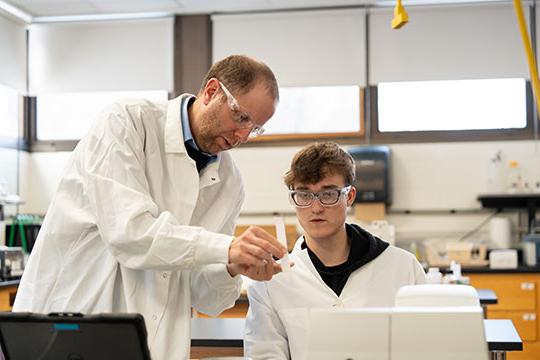Alumnus Ross Munson brings his high school biology students to campus for lab experience

As an undergraduate biology major at Alfred University in the early 2000s, Ross Munson took a plant biology class taught by Cheryld Emmons which included the study of photosynthesis. For the last nine years Munson, now a high school biology teacher in the Wellsville Central School District, has brought a group of his students to campus to take a day-long workshop and experience what it is like to learn in a college environment.
The workshop—held on Wednesday, Jan. 15, in the biology lab in Alfred University’s Science Center, —is part of a dual-enrollment course offered in partnership with the university. A group of five Wellsville students are enrolled in the course, which earns them four college credits each for introductory Bio 101 and 102 classes taught during the fall and spring semesters, respectively. Beyond the benefit of earning eight college credits toward meeting science course requirements, students are given the opportunity to experience life as a college student while working in a college lab setting.
“This exposes students to the rigors of a college course in a supportive environment, with access to college faculty they don’t have at the high school level,” said Munson, who earned a bachelor’s degree in biology in 2006 and a master’s in numeracy in 2008, both from Alfred University, and has been teaching at Wellsville for 11 years. “They’re getting exposure to college-level biology instruction and access to a college biology lab setting.”
“Technically, they’re taking an Alfred University course in general biology,” said Emmons, who retired from Alfred University in May 2024. “Ross is putting his students through the same rigors as I put Ross and my other students through. The students are getting a real dose of what it’s like to be a college student. It gives them lab experience they just can’t get at Wellsville.”
In Emmons’ workshop, students spend the day studying research techniques related to plant biology. “The (Alfred University) biology lab has equipment here that allows us to measure photosynthesis at the molecular level. The Wellsville students use the same equipment used by Alfred students taking botany classes,” she explained.
“This supports Ross, who is preparing his students for college. The techniques we’re teaching is what one would perform in a college lab. This gives students an idea of what to expect in a college course.”

Cheryld Emmons (right) retired biology professor at Alfred University, watches as Wellsville High School senior Marissa Weinhauer grinds spinach with acetone in order to extract chlorophyll from the plant matter. Marissa was one of five students of Wellsville High School biology teacher and Alfred University alumnus Ross Munson who participated in an Emmons-led workshop on photosynthesis held in the biology lab at Alfred University.
Added Munson, “We want to give them the most authentic experience possible. (At Wellsville) they don’t have access to the lab and equipment they have here. That’s why we do this.”
Munson said the course may steer students toward biology as they consider a college major, or it may get them thinking about going in another direction. “We’ve had students really jazzed about biology take this class and decide it’s not really for them. On the flip side, we’ve had students who came in not really interested in biology, maybe just taking the class to take care of their college science requirements, and they find out they’re really interested in it. This allows the students to kind of take a test run.”
Over the years he has taught the course at Wellsville, Munson has emphasized offering experiential learning opportunities. In 2017, his students formulated an experiment that was selected for testing on the International Space Station as part of the Student Spaceflight Experiments Program. Students have taken field trips to places like Green Light Biosciences, a biological pest control company in Rochester; MOOG, an aerospace and defense products manufacturer in Buffalo; and the Roswell Park Comprehensive Cancer Center in Buffalo. Each experience exposes students to aspects of science and technology they just can’t find in the classroom.
“Kids only know what they know; they don’t really know what’s possible,” Munson said. “That’s why we take them on these trips.”
The Wellsville High School seniors who came to the Alfred University campus Wednesday for Emmons’ workshop came away impressed with experience.
“It’s a nice way to see how real-life research is done, to be able to get an example of what college research is like,” said Evan Billings, who is considering majoring in genetic engineering in college. He pointed to some of the lab equipment he and fellow students were able to use. “We’ve used a spectrophotometer (in the high school lab) that measures light. It is significantly better here.”

Cat Clarke, assistant professor of genetics/plant biology/biostatistics at Alfred University (right), works with Wellsville High School senior Evan Billings as he filters spinach acetone slurry to extract the chlorophyll to be used in the experiment. Evan was one of five students of Wellsville High School biology teacher and Alfred University alumnus Ross Munson who participated in a workshop on photosynthesis, which was held in the biology lab at Alfred University and led by Cheryld Emmons, retired biology professor.
“It’s nice to be in a college environment and get hands-on experience in the lab,” added Lucius Griggs, who hopes to major in engineering in college. He said he took Munson’s course in part to earn the college credits but said he also wanted to see if he would be interested in studying biology in college. “The equipment here is more advanced, and working with a professor is cool; this will help prepare me for college.”
Emmons said she will continue offering the photosynthesis workshop as long as Munson asks. She is hopeful that Cat Clarke—who was appointed assistant professor of genetics/plant biology/biostatistics upon Emmons’ retirement and was on hand for the workshop—could take over for her in overseeing the instruction.
